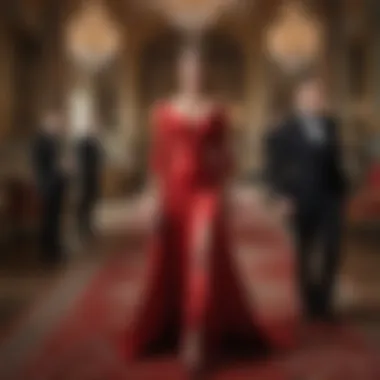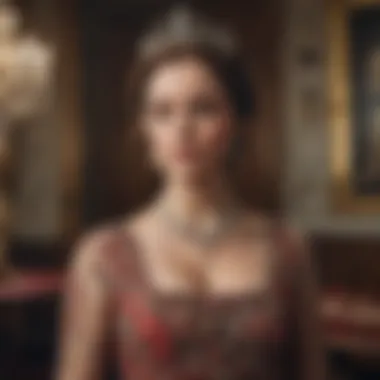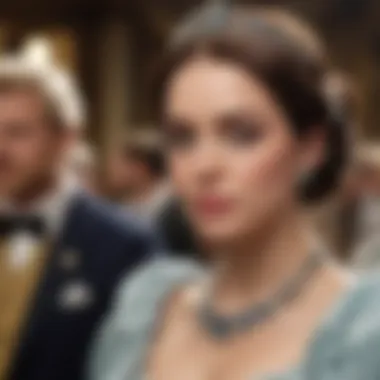Exploring the Intricacies of the UK Royal Family


Intro
The UK Royal Family is an enduring institution that has evolved over centuries. Their history is rich with milestones that have shaped not only the monarchy but also the nation itself. This exploration seeks to unravel the layers of tradition, duty, and public perception surrounding these figures. The complexities of their roles in British society and beyond warrant a thorough examination.
While some view the monarchy as an outdated relic, others see them as a vital part of national identity. Each member of the family plays a distinct role, contributing to various charitable endeavors and representing the UK on the international stage. As the monarchy faces challenges and demands for greater transparency, the nuances of their existence become increasingly relevant.
In this article, we will dissect the present dynamics within the Royal Family. We will delve into each member's contributions, the evolving public perceptions, and how their work intersects with contemporary societal issues. Through this exploration, we aim to provide clarity and insight into a powerful institution that continues to capture public interest and scrutiny.
"Understanding the Royal Family is integral to understanding modern British culture and history."
Themes discussed will include their influence on global relations, the traditions that define them, and the societal expectations they uphold. Join us as we navigate through the past, present, and future of the UK Royal Family, addressing the key points that define their impact on society.
Historical Overview of the UK Royal Family
The historical evolution of the UK Royal Family serves as a lens through which we can understand the complexities surrounding the monarchy. It is not just about lineage; it is about the cultural, political, and social roles that the monarchy has played throughout history. This overview is crucial because it sets the tone for discussions about the current state of the royal family and its relevance today.
Through examining the past, we gain insight into how historic events shaped current structures and societal perceptions. These narratives are woven into the very fabric of British identity, providing citizens with a sense of continuity and tradition.
Origins and Evolution
The origins of the UK Royal Family can be traced back to various tribal kingdoms in Britain. These early monarchs laid the groundwork for what would eventually evolve into a unified kingdom. The unification of England under King Æthelstan in the 10th century marked a significant moment. This laid the foundation for the future monarchs, beginning a lineage that would reach into the modern era.
Over the centuries, the monarchy transformed. The Norman Conquest of 1066 brought about major changes, as William the Conqueror established a new order. This event introduced feudalism, which affected land ownership and governance in England.
With events like the signing of the Magna Carta in 1215 and the English Civil War in the 17th century, the royal power fluctuated greatly. The emergence of parliament marked a pivotal moment in limiting monarchical power, leading to a constitutional framework we recognize today.
Key Monarchs and Their Impact
Numerous monarchs have helped shape not only the monarchy but the nation itself.
- King Henry VIII is perhaps one of the most iconic figures. His reign brought about significant religious reform as he separated the Church of England from the Roman Catholic Church.
- Queen Victoria, reigning from 1837 to 1901, presided over a period of industrial, cultural, and scientific progress. This era expanded the British Empire and significantly broadened the monarchy's global influence.
- Queen Elizabeth II, the longest-reigning monarch in British history, navigated both tradition and modernity. Her reign saw the decolonization of Africa and the Caribbean, changing Britain's role on the world stage.
Each of these monarchs has left an imprint on British history. Understanding their contributions deepens our comprehension of the current monarchy and its evolving role in society. The historical overview establishes a foundation to explore the monarchy's contemporary significance and its potential future.
The Role of the Monarchy Today
The monarchy in the United Kingdom plays a multifaceted role that extends far beyond mere symbolism. It serves as both a constitutional body and a deeply ingrained cultural institution, influencing various aspects of national life. Understanding the role of the monarchy today requires examining its constitutional functions and its ceremonial duties. Each of these components contributes uniquely to the fabric of British society, illustrating the significance of the monarchy in contemporary times.
Constitutional Functions
The constitutional role of the monarchy is fundamental to the UK’s political system. The monarch, currently King Charles III, functions as the head of state, embodying unity and continuity in the nation’s governance. Importantly, this role involves a variety of tasks, many of which are performed on the advice of the Prime Minister and government ministers.
Key aspects of the constitutional functions include:
- Opening and Dissolving Parliament: The monarch exercises the ceremonial responsibility of the State Opening of Parliament, where they give the Queen's Speech, outlining the government’s agenda. They also have the power to dissolve Parliament, although this is rarely exercised directly.
- Royal Assent: No legislation can become law without the royal assent. Although it is a formality today, this function symbolizes the monarchy's role in the legislative process.
- Summoning of Elections: The monarch also summons general elections, a duty carried out in accordance with the fixed terms of Parliament.
- Appointment of the Prime Minister: Following an election, the monarch invites the leader of the party with a majority to form a government, reinforcing the democratic processes within the monarchy’s constitutional framework.
These functions demonstrate how the monarchy underpins the UK's democratic system, ensuring it remains stable and functional, while remaining apolitical in nature.
Ceremonial Duties


Ceremonial duties represent another vital aspect of the monarchy's role in society. These functions help maintain traditions and foster national pride, creating a sense of belonging among citizens. The ceremonial duties extend beyond government functions, impacting cultural events and public life directly.
Notable ceremonial responsibilities include:
- Official Appearances: The monarch and other royal family members participate in numerous official events throughout the year, symbolizing royal support for various causes and institutions.
- State Visits: The monarchy plays a crucial role in international diplomacy, with state visits that help strengthen relationships between countries. These visits often feature elaborate ceremonies, showcasing British heritage and hospitality.
- National Celebrations: High-profile occasions such as Trooping the Colour and Remembrance Day serve as reminders of the monarchy’s historical significance and national unity. The presence of royals at these events draws public attention and fosters national pride.
- Awards and Honors: The monarch also presides over the Investiture ceremonies, where honors such as knighthoods are bestowed, acknowledging exceptional contributions to society across various sectors.
"The monarchy is not just a relic of a bygone era; it is an institution that shapes contemporary British political and cultural life."
Through these ceremonial roles, the monarchy engages with the public while reinforcing its importance to the national identity. Despite the challenges that come with modernizing perceptions of the monarchy, these functions continue to resonate with people across generations.
Notable Members of the Royal Family
The members of the UK Royal Family hold significant importance within the monarchy and the nation as a whole. Their actions and personal lives are often a reflection of broader societal values and concerns. Understanding the roles of these individuals allows for deeper insight into the functioning and evolution of the monarchy. Notable members shape public perception and influence the royal brand, as they engage in ceremonial, charitable, and diplomatic activities. Such interactions serve to underline the monarchy's relevance in contemporary society.
The Queen's Legacy
Queen Elizabeth II has had a profound influence on the monarchy and British society. Her reign, which spanned over seven decades, is a testament to resilience and dedication. Her role extended beyond being a symbolic figure; she was deeply involved in state affairs and represented continuity amidst changing political landscapes.
Her commitment to duty was evident during times of crisis, including the COVID-19 pandemic, when her messages resonated with many citizens. The Queen's ability to maintain a sense of tradition while adapting to modernity showcased her adeptness as a monarch. This legacy is especially seen through her support for charitable causes and numerous organizations that strive for social improvement.
In addition to her charitable works, Elizabeth II's personal trials and public appearances contributed to the humanizing of the monarchy. Her unwavering demeanor during personal losses, like the passing of her husband Prince Philip, left a lasting impression on the public.
The Heir Apparent: Prince William
Prince William, the eldest son of Charles, Prince of Wales, represents the future of the monarchy. His approach to royal duties has been marked by a blend of tradition and modernity. Focused on mental health, environmental issues, and public service, he embodies a new generation of royals who seek to address contemporary societal challenges.
William's role is further strengthened by his marriage to Catherine, Duchess of Cambridge. Together, they have championed causes related to mental health awareness, early childhood development, and wildlife conservation. Their approachability and relatability resonate well with a younger audience, allowing them to bridge the gap between the monarchy and modern public sentiment.
Moreover, his interest in charitable work illustrates the evolving nature of royal responsibilities. His commitment to diverse initiatives signifies a sensitive understanding of the current social landscape.
Emerging Influences: Prince Harry and Meghan Markle
Prince Harry and Meghan Markle have become influential figures in their own right, particularly after stepping back from royal duties. Their departure from full-time royal life signified a profound shift in positioning within the royal family. Harry's candid discussions about mental health, service, and personal struggles add layers to the modern narrative surrounding royalty.
Meghan, as a biracial member of the royal family, highlighted issues of race and identity alongside royal traditions. Their joint endeavors, such as the establishment of the Archewell Foundation, focus on social compassion and community support. Despite facing considerable media scrutiny, they have created a platform that aims to inspire positive change.
The couple's engagement with the media industry, through various projects and their outspoken nature, pose challenges to traditional royal conduct. However, their influence extends beyond the monarchy, as they champion social justice and equality on a global scale.
"Prince Harry and Meghan Markle redefine what it means to be a member of the royal family in the 21st century."
Understanding these notable members provides insight into how the monarchy adapts and interacts within a rapidly evolving societal structure. By examining their legacies, endeavors, and influences, we see the continuing relevance of the UK Royal Family in addressing both historical and contemporary issues.
Public Perception and Media Representation
The relationship between the UK Royal Family and the public has always been complex. Public perception is shaped by a multitude of factors, including the actions of individual royals, historical context, and the portrayal in media. Understanding this dynamic is crucial for comprehending the broader role the monarchy plays in contemporary society.
Social opinion can influence the monarchy's relevance and its duty. As a living institution, the Royal Family must maintain an image acceptable to the public while fulfilling its constitutional roles. Negative public perception can lead to questions about the necessity of the monarchy altogether, making this topic significant in all discussions about royal affairs.
Royal Family in Popular Culture
In modern society, the Royal Family is often depicted in popular culture, influencing how people perceive royal traditions. Movies, documentaries, and even television shows contribute to shaping the public's image of the monarchy. For instance, the Netflix series "The Crown" has stirred considerable discourse regarding both historical events and the personal lives of royal members, thereby making history accessible yet controversial.


Through social media, the public receives snippets of royal activities. Accounts like Instagram allow princes and princesses to showcase their lives, generating both admiration and criticism.
Key elements include:
- Media portrayals: Film and literature offer imaginative interpretations of royal figures, often emphasizing scandal or drama.
- Public engagements: Events attended by royals reinforce a connection with the public, showcasing their commitment to community.
Media Scrutiny and Privacy Issues
The Royal Family operates under a relentless lens of media scrutiny. This scrutiny can lead to significant privacy issues. The balance between public interest and private life is an ongoing challenge for royals. Sensitive moments, such as personal tragedies or adjustments within the family, often become tabloid fodder.
Moreover, the pressure to respond to media containing speculation can undermine the dignity of the institution.
It is vital to note that the monarchy itself has attempted to address these issues by setting clearer boundaries about what is shared publicly. This includes:
- Public relations strategy: Engaging with communication experts to manage narratives effectively.
- Legal actions: Occasionally pursuing legal channels against publications that infringe on their privacy.
"The Royal Family is not only a symbol of tradition but also a reflection of evolving social values and concerns, directed increasingly by public opinion."
The Royal Family’s Influence on Society
The impact of the UK Royal Family on society goes beyond the realm of tradition and ceremonial duties. Their role manifests in various aspects, notably in philanthropy and cultural symbolism. The monarchy's influence can shape public opinion and foster community engagement. This section seeks to delve into those key elements of the Royal Family's societal influence, highlighting their charitable endeavors and the profound cultural symbolism they embody.
Charitable Endeavors and Philanthropy
The Royal Family's engagement in charitable work is prominent. Members of the monarchy patronize numerous charities and organizations, significantly enhancing public awareness of various social issues. This involvement is not merely symbolic but carries substantial weight in fundraising and social advocacy.
- Duchess of Cambridge, Kate Middleton, actively emphasizes mental health initiatives through the "Heads Together" campaign. Her role has brought attention to the importance of mental well-being, encouraging open discussions among citizens.
- Prince Charles, through the Prince's Trust, has invested in youth development and education. His efforts aim at empowering young people facing disadvantages, making a tangible difference in their lives.
- The Queen Elizabeth II Award for Voluntary Service recognizes outstanding charitable work by volunteers across the UK, showcasing the monarchy's commitment to philanthropy.
These charitable endeavors strengthen community bonds and reflect the values upheld by the Royal Family. They offer a counterpoint to the often scrutinized aspects of royal life, reminding the public of the monarchy’s potential for positive influence in society.
"Charity brings people together. The Royal Family showcases not only its commitment but also options for civic engagement, fostering greater societal cohesion."
Cultural Symbolism and National Identity
The Royal Family serves as a cultural symbol for the United Kingdom, encapsulating a national identity that is both revered and debated. The monarchy evokes a sense of pride and continuity in British history. Key elements include:
- Tradition and Heritage: The monarchy represents centuries of tradition, influencing perceptions of British heritage. Events such as the Trooping the Colour or royal weddings showcase national pride.
- Unity and Stability: In times of crisis or change, the Royal Family often steps forward to provide reassurance and unity. Their presence can evoke feelings of stability and continuity in the fast-paced modern world.
- Global Representation: The monarchy acts as an ambassador for the UK, shaping how the country is perceived globally. Royal tours and engagements often highlight British culture, businesses, and values, enhancing the nation’s soft power.
Understanding the cultural significance of the Royal Family is essential in discussing their influence. They embody a complex interplay of nostalgia and modern values, appealing to diverse groups within society. As such, the monarchy remains a focal point of discussions about national identity and its evolving nature in contemporary society.
Controversies Surrounding the Royal Family
The United Kingdom's Royal Family is not only a symbol of tradition and stability but also has been a subject of numerous controversies. These controversies highlight the intricate balance between public expectations and the realities of monarchy. The significance of discussing these controversies cannot be understated. They provide insights into how the monarchy adapts to modern society and how public opinion can shape its trajectory. Furthermore, they reveal the vulnerabilities of an institution often perceived as invulnerable.
Scandals and Public Outcry
Numerous scandals have plagued the Royal Family over the years. From extramarital affairs to financial mismanagement and allegations of racism, these incidents have challenged the institution's integrity. A notable example includes the fallout from Princess Diana's marriage to Prince Charles. The tumultuous relationship captured public attention and led to a wider discussion about mental health and the pressures of royal life.
Another scandal emerged in recent years involving Prince Andrew, who faced serious allegations regarding his associations with convicted sex offender Jeffrey Epstein. The public reaction was immediate and fierce, encapsulating a growing intolerance for perceived impropriety. Many questioned the appropriateness of his title and the privileges afforded to him.


These scandals often lead to public outcry, creating rifts between the monarchy and the populace. They raise concerns over transparency and accountability within the royal institution. The response to scandals can influence public perception significantly, with calls for reform or even constitutional changes. For instance, following each scandal, there is often a surge in discussions surrounding the relevance of the monarchy, leading to polarized views within society.
The Debate on Abolishing the Monarchy
The controversies surrounding the Royal Family often spark debates on whether the monarchy should continue to exist. Critics of the monarchy argue that it is an outdated institution that does not reflect modern values of equality and democracy. Among these critics are voices from various political backgrounds, with movements advocating for a republic gaining traction over time.
Supporters of the monarchy maintain that it provides a sense of continuity and cultural identity for the UK. They argue that the ceremonial and unifying aspects of the monarchy contribute positively to societal cohesion. However, the tension emerges when considering the impact of ongoing controversies. Events such as the aftermath of scandals can trigger intense public discourse about the need for change. Many question if an institution founded on inherited privilege can adapt to contemporary ideals.
"The essence of the monarchy’s existence is increasingly challenged by societal transformations and rising expectations for accountability, pushing the institution to reconsider its role."
In summary, controversies serve as pivotal moments for the Royal Family. They test the limits of public patience and provoke much-needed dialogue about the future of the monarchy. As debates intensify, both sides must grapple with what the Royal Family means to Britain—a relic of the past or a crucial element of national identity. The future may depend on how effectively the monarchy addresses these controversies and engages with public sentiment.
International Relations and the Monarchy
The monarchy plays a crucial role in shaping the United Kingdom's international reputation and fostering diplomatic relationships. In this section, we will examine how the royal family operates within the realm of international relations and the implications of their actions on UK diplomacy.
Diplomatic Roles of the Monarch
The monarch serves as a symbol of the UK's unity and continuity. Representing the nation on official visits, the Queen and other royal family members engage with heads of state and dignitaries from across the globe. These visits are more than mere formalities; they serve to strengthen bilateral ties. For instance, Queen Elizabeth II visited various Commonwealth countries, reaffirming the shared history and restoring connections. Each trip is carefully planned to showcase British culture, values, and interests.
Furthermore, the monarchy hosts state visits, offering a platform for foreign leaders to engage with the UK. Such events emphasize the importance of personal relationships in diplomacy. The monarch's presence can elevate discussions, fostering goodwill and promoting trade and cultural exchanges.
The Royal Family as Soft Power
Soft power refers to the ability to influence others through attraction and persuasion rather than coercion. The royal family is a potent symbol of soft power for the UK. Their image, often associated with tradition, stability, and continuity, resonates not just with British citizens but also with people around the world. This representation can be advantageous in diplomatic negotiations and international relations.
Several key elements highlight the royal family's soft power:
- Cultural Diplomacy: Through participation in cultural events and charitable functions, the royals promote UK arts and heritage globally. These engagements showcase British excellence and foster connections with other nations.
- Philanthropic Efforts: Initiatives led by royal family members often address pressing global issues, such as health and education. Their involvement lends credibility and visibility to these causes, attracting global attention and support.
- Public Sentiment: The royal family can influence public opinion on domestic and foreign policy. Their stances on international issues can reflect and shape citizens' views. For example, when they express support for specific humanitarian causes, it can rally public interest and action.
The monarchy embodies a tradition of diplomacy that transcends mere political maneuvering, emphasizing relationships and cultural ties.
In summary, the monarchy's engagement in international relations, through both diplomatic roles and soft power, underscores its significance in contemporary society. By facilitating communication and fostering goodwill, the royal family not only enhances the UK's global standing but also plays a vital role in the complexities of foreign relations.
Future of the Monarchy
The future of the monarchy has been a topic of frequent discussion within both academic circles and public discourse. As an institution that has witnessed centuries of evolution, the monarchy's next chapter is particularly significant. In a rapidly changing world, it must now navigate public sentiment, social change, and global expectations. The role of the monarchy is no longer simply ceremonial; it has become deeply intertwined with national identity, cultural representation, and even diplomatic relations. Understanding the future of the monarchy provides insights into its potential adjustments to remain relevant in contemporary society.
Challenges Ahead
Despite its long-standing history, the monarchy faces numerous challenges moving forward. One major concern is public opinion. In recent years, the royal family's popularity has fluctuated, influenced by scandals and changing societal values. The ongoing debate about the relevance of the monarchy presents an existential challenge. Many question whether a hereditary institution aligns with democratic values or represents an outdated system.
Another challenge is adapting to the digital age. Social media has transformed how public figures engage with their audience. The Royal Family must find a balance between maintaining tradition and embracing modern communication. Furthermore, there are economic constraints that affect royal funding and public support. Understanding these factors is crucial for assessing the monarchy's trajectory.
As stated by historian Richard Fitzwilliams,
"The monarchy must constantly adjust to societal changes to stay relevant, or risk losing its place in a modern democracy."
Adaptations to Modern Society
To address the challenges it faces, the monarchy has shown a willingness to adapt. Recent initiatives include increasing transparency and engagement through social media platforms. The royal family's presence on platforms like Instagram and Twitter has allowed for a more personal connection with the public, particularly younger generations. This shift indicates a recognition of the monarchy’s need for modernization.
Additionally, charitable work is a key component of the monarchy’s contemporary role. Members of the Royal Family frequently champion various causes, from mental health to environmental issues. This aligns the monarchy with current social priorities, reinforcing its relevance in today's society.
Moreover, the monarchy's approach to diversity and inclusion is also evolving. This change reflects broader societal movements towards representation and equality. The recent experiences of Prince Harry and Meghan Markle highlighted both the potential and challenges of this shift. The future of the monarchy will likely depend on its capacity to continue these adaptations while remaining rooted in tradition.
By addressing public concerns and aligning with modern values, the monarchy can enhance its relevance in an increasingly dynamic world.



